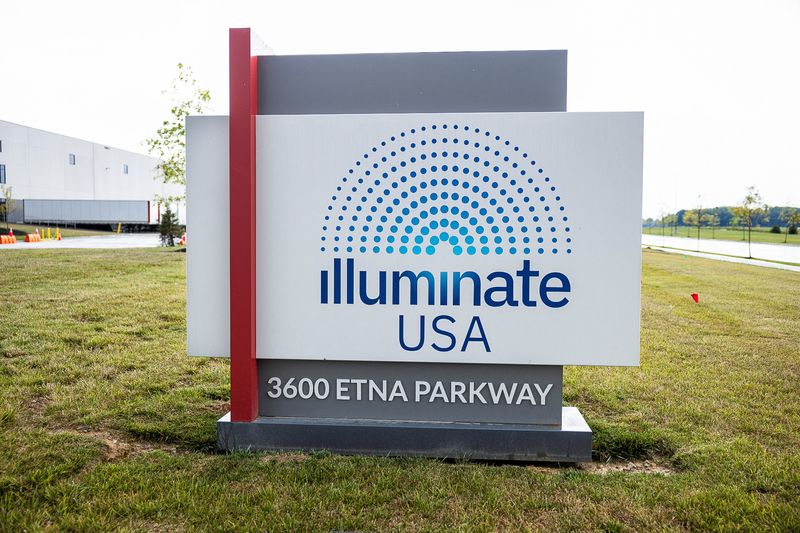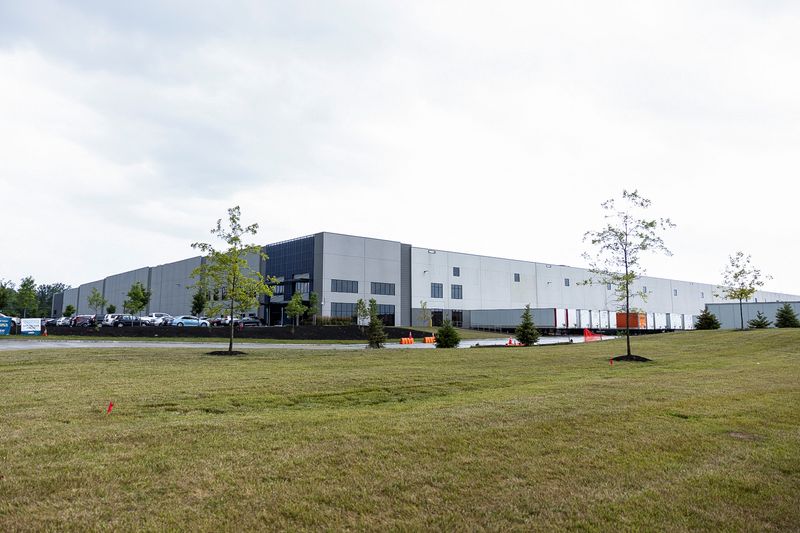By Nichola Groom
(Reuters) -Construction of U.S. solar-manufacturing plants by Chinese companies is surging, putting China in position to dominate the nascent industry, as other American factories struggle to compete despite federal subsidies.
Chinese companies will have at least 20 gigawatts' worth of annual solar panel production capacity on U.S. soil within the next year, enough to serve about half the U.S. market, according to a Reuters analysis of corporate statements, government documents, and interviews with eight companies and researchers.
The group includes seven companies backed by Chinese firms including Jinko Solar, Trina Solar, JA Solar, Longi, Hounen, Runergy, and Boviet, according to the analysis.
The projected rapid increase in U.S. solar panel production by Chinese-owned companies has not previously been reported, and represents a worrying result for President Joe Biden's climate agenda. While his administration is keen for new investment that creates U.S. jobs in clean energy, his government is also desperate to prevent over-reliance on geopolitical rival China as the economy transitions from oil and gas to renewables.
Chinese-backed companies have distinct advantages over competitors in the U.S., such as heavily subsidized supply chains for raw polysilicon and unfinished solar modules, as well as low-cost government financing. Like non-Chinese companies, they also collect U.S. subsidies for clean energy manufacturing embedded in the 2022 Inflation Reduction Act, Biden's signature climate law.
"You have a stacked deck here. It’s hard to imagine that anyone, particularly a greenfield manufacturer, can do it as quickly as a Chinese manufacturer," said Paula Mints, founder of solar industry research firm SPV Market Research, referring to new factories.
She and one other researcher added, however, that the Chinese investment would help the domestic solar manufacturing industry mature while creating jobs.
"They have a lot more experience building factories and setting up supply chains," said David Feldman, a solar market researcher with the U.S. Department of Energy's National Renewable Energy Laboratory.
Local and state officials in places where Chinese firms are setting up factories, including Texas, Arizona, Ohio and North Carolina, have welcomed the investments.
'WE NEED AMERICAN MANUFACTURERS'
Non-Chinese manufacturers in the United States, by contrast, have found it hard to compete against a flood of cheap imports and are worried by China's outsized presence. As many as half of the announced U.S. factories may not materialize, Reuters reported last year.
U.S.-based Convalt, for example, is struggling to bring online 10 GW of U.S. capacity at a factory it started building in upstate New York in 2022.
"If we are to succeed, we need American manufacturers like Convalt to survive this onslaught of low prices, to build factories with capacities that allow us to compete against the largest global firms, with Chinese beneficial ownership," CEO Hari Achuthan said in May in testimony to the U.S. International Trade Commission, a government agency that is considering a request by Korea's Hanwha Qcells and other U.S. manufacturers to impose new tariffs on some solar imports.
Convalt's plant would make panels plus the cells, wafers and ingots that go into them, but progress stalled a year ago as global panel prices plunged 50% to levels below Convalt's cost of production, he said.
"Had we not had these low prices we should be up and running today," Achuthan said.
The Department of Energy told Reuters that developing a domestic solar supply chain would take time and that the U.S. must rely on foreign businesses for their expertise.
'COMMITTED TO BE HERE'
Chinese companies, by far the top suppliers of solar and electric-vehicle battery components imported to the U.S., now account for one-fifth of the solar factories announced since the U.S. adopted new climate subsidies, according to research firm Wood Mackenzie.
The United States has tried to ease its import addiction to Chinese solar products with tariffs, and has also banned goods linked to China's Xinjiang region over concerns about forced labor. It is now considering new duties on components made in other Asian countries where Chinese manufacturers have set up.
Chinese companies building factories in the U.S. so far are mainly investing in module production, in which solar cells imported from Asia are assembled into panels.
Longi, the world's third-biggest solar producer, for example, is pumping out panels in Pataskala, Ohio through a joint venture with U.S. clean-energy developer Invenergy called Illuminate USA. The five-gigawatt plant is among the largest announced since passage of the IRA, and the company is also exploring the possibility of building a cell facility.
"Illuminate USA is an American company, majority owned by Invenergy, who owns both the facility and the land where over 1,000 Ohioans will produce more than nine million high-quality solar panels annually at full capacity later this year," Illuminate spokesman Eric Heis said in a statement.
Trina, the No. 4 global manufacturer, plans to start a five-GW panel factory in Texas this year, and is also planning a cell facility.
"We are committed to be here and we are spending a lot of time and money to make that a reality," said Mike Nelson, head of legal for Trina's North American business.
Trina said its U.S. subsidiary is a U.S.-registered company that sources the polysilicon it uses to produce its equipment from European and U.S. sources.
While Chinese producers face opposition from some other U.S. factory owners, panel-buying U.S. project developers interested in low-cost supply welcome them.
The American Clean Power Association, a clean-energy trade group, said the U.S. solar-manufacturing sector is attracting global and domestic investment. It said U.S.-headquartered companies make up most of the operating and planned panel production.
Top U.S. producers, Hanwha Qcells and Arizona-based First Solar (NASDAQ:FSLR), are pushing for the U.S. to impose new tariffs on component and equipment imports from countries where their Chinese rivals have built factories to supply the U.S.

"We're just asking for legitimate U.S. manufacturers to have a chance to compete with these gigantic Chinese-owned companies," said Tim Brightbill, attorney for the American Alliance for Solar Manufacturing Trade Committee, the group seeking new tariffs.
The group's rivals argue that placing duties on some cell imports and not others is unfair and will stifle construction of U.S. factories.
